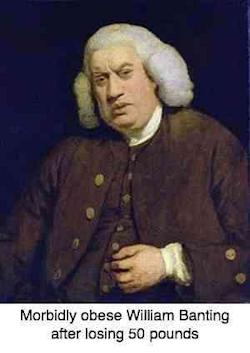

Early Dietary Beliefs
Greek Athletes
Some ate bread and potatoes before events. - Carbohydrate - Glucose metabolism.
Some ate only meat before events. - Lipids - Fatty acid and ketone metabolism.
Sailors Diets - Scurvy
In 1747 Lime juice was recommended by naval physician James Laird
In 1777 Captain James Cook won a medal for "winning the battle against scurvy."
Regular use of lime juice by British sailors was only common after 1800.
Living Without Vegetables - Arctic Exploration
In 1840 - Sir John Frankin, with two ships and 129 men disappeared in the arctic.
In 1879 - Lt. Fredrick Schwatka, of the US Army, spent 11 months searching for the Franklin Expedition. He returned with all his party.
They had lived with the Inuit, eating only the Inuit diet for 11 months. Seal meat and seal fat, with a little fish. Schwatka's report to the US Army was ignored. Not considered relevant.
Banting's Success
His diet worked well and was widely adopted.
Quoted in "The Principles and Practice of Medicine," 1892, by Harvard University Press.
